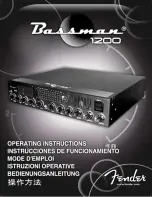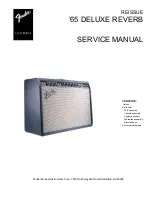
4
On
Off
On
Standby
Channel
Select
Channel A
Channel B
Master
Presence
Mode
Level
Level
BASS
MID
TREBLE
GAIN
BASS
MID
TREBLE
VOLUME
INPUT
DSP
0
10
0
10
0
10
0
10
0
10
0
10
0
10
0
10
0
10
0
10
0
10
V F X
V F X
V F X
SLAP
BACK
CHORUS
DELAY 1
DELAY
2
DELAY•
REV 1
DELAY•
REV 2
VIBRATO
FAST
VIBRATO
SLOW
BYPASS
T-WAH
CHO•
REV
SLAP
CHORUS
CHO•REV•
DELAY
SMALL
REV
MED
REV
LARGE
REV
1
2
3
4
5
7
8
9
10
11
12
13
14
15
16
17
6
The Front Panel:
V F X 5 1 1 2 / 5 2 1 2 G u i t a r A m p l i f i e r
1. Input: Connect your instrument
here by means of a shielded signal
cable.
2.. Volume: Use this control to
adjust the output level of Channel
A.
3. Treble: Use this control to adjust
the output level of the high frequen-
cies for Channel A. This control
provides an adjustment range of
30dB at 10kHz.
4. Mid: Use this control to adjust
the output level of the middle fre-
quencies for Channel A. This con-
trol provides an adjustment range
of 6dB at 600Hz.
5. Bass: Use this control to adjust
the output level of the low frequen-
cies for Channel A. This control pro-
vides an adjustment range of 30dB
at 80Hz.
6. Channel Select: This switch,
when depressed, activates
Channel B. Channel A is active
when the switch is in the out posi-
tion.
7. Gain: Use this control to adjust
the gain for Channel B. With the
control towards the counter clock-
wise position, the gain is low and
very little distortion is present. As
you rotate the control clockwise the
gain increases, producing more
overdrive distortion and a higher
output volume level.
8. Treble: Use this control to adjust
the output level of the high frequen-
cies for Channel B. This control
provides an adjustment range of
10dB at 4kHz.
9. Mid: Use this control to adjust
the output level of the middle fre-
quencies for Channel B. This con-
trol provides an adjustment range
of 10dB at 1kHz.
10. Bass: Use this control to adjust
the output level of the low frequen-
cies for Channel B. This control
provides an adjustment range of
12dB at 100Hz.
11. Level: Use this control to adjust
the output level of Channel B.
12. DSP Mode: Use this control to
select which of the following digital
effects to apply to the signal.
BYPASS
no effect
SMALL REV
small room reverb
MED REV
medium room reverb
LARGE REV
large hall reverb
SLAPBACK
short slapback echo
DELAY 1
short delay w/regen
DELAY/REV 1
short delay w/reverb
DELAY 2
long delay w/regen
DELAY/REV 2
long delay w/reverb
VIBRATO SLOW
slow smooth vibrato
VIBRATO FAST
fast vibrato/tremolo
CHORUS
medium chorus
CHO/REV
medium chorus w/reverb
CHO/REV/DELAY med cho w/reverb/delay
SLAP CHORUS
slapback echo w/chorus
T-WAH
touch-sensitive wah-wah
13. DSP Level: Use this control to
adjust the level of the DSP effect.
With the control rotated fully count-
er clockwise, no effect will be audi-
ble. As the control is rotated clock-
wise the amount of the effect is
increased.
14. Presence: Use this control to
adjust the overall brightness and
punch of the output signal.
15. Lamp: This lamp illuminates
when the amplifier is turned on.
16. On/Standby Switch: Use this
switch to activate the amplifier after
the On/Off Switch (#17) is turned
on. Always turn this switch OFF
first and ON last! Turn the
On/Off Switch (#17) on at least
30 seconds before turning on
the Standby switch. During short
breaks you should turn this switch
off and leave the On/Off Switch on.
This will help prolong the life of the
amplifier’s tubes.
17. On/Off Switch: Use this switch
to turn the amplifier on and off.
Always turn this switch ON first
and OFF last! Turn the Standby
switch (#16) on at least 30 sec-
onds after turning on the On/Off
Switch.
Содержание VFX5112
Страница 1: ...U S E R S G U I D E ...






























